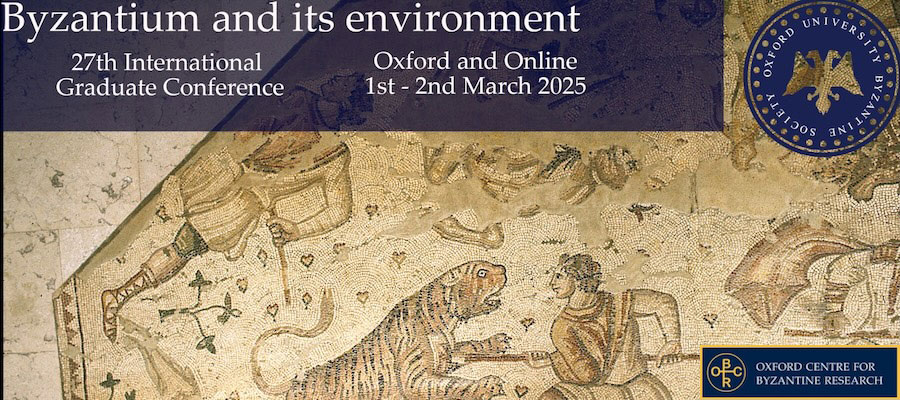Byzantium and Its Environment, 27th International Graduate Conference of the Oxford University Byzantine Society, University of Oxford and online, March 1–2, 2025
We are pleased to announce the call for papers for the 27th Annual Oxford University Byzantine Society International Graduate Conference on the 1st-2nd March 2025. Papers are invited to tackle the ‘environment’ of the Late Antique and Byzantine world (very broadly defined).
In recent decades, the global community has taken more and more of an active and serious interest in the environment and climate system in which we live. Scholars of Byzantium and Late Antiquity have likewise begun to apply environmental lenses to their research, and have come away with a number of new and exciting perspectives. From scientific analysis of the climatic shifts that occurred throughout the period on both macro and micro scales, to revisionist views of already well-trodden events, these new perspectives are greatly contributing to our field.
The framework of ‘the environment’ here can be applied very broadly, touching on any aspect of the natural world, with novel and imaginative approaches to the notion being strongly encouraged. Some suggestions by the Oxford University Byzantine Society for how this topic might be treated include:
- The Analytical – Pollen analysis, dendrochronology, ice cores, and everything in-between; the historical significance of this data and what it can tell us
- The Political and Economic – Climate’s impact on internal and external politics, adaptions in trade and policy, effects on particular military campaigns
- The Cultural – Changes in attitudes and output as a result of shifting climates, nature’s representation and role in literature
- The Societal – Movement of people and changes to the social order as a result of climatic change; variations in the impact of climate change depending on class or occupation, regional adaptations to specific micro-climates
- The Religious – Responses to unusual weather events and interpretations of changing climates by different religious communities; religious attitudes towards nature and man’s place in it
- The Artistic and Architectural – Environmentally-focused artwork and its uses; the use of landscapes both natural and man-made; changes in design or materials in response to changing climates
- The Archaeological – Changing use of the land during periods of climatic shift; abandonment and re-settlement due to changing weather or specific events
- The Historiographical – How environmental factors have evolved over time in scholarship
Papers should be twenty minutes in length and may be delivered in English or French.
The conference will have a hybrid format, with papers delivered at the Oxford University History Faculty and livestreamed online for a remote audience. Accepted speakers should expect and plan to participate in person.
